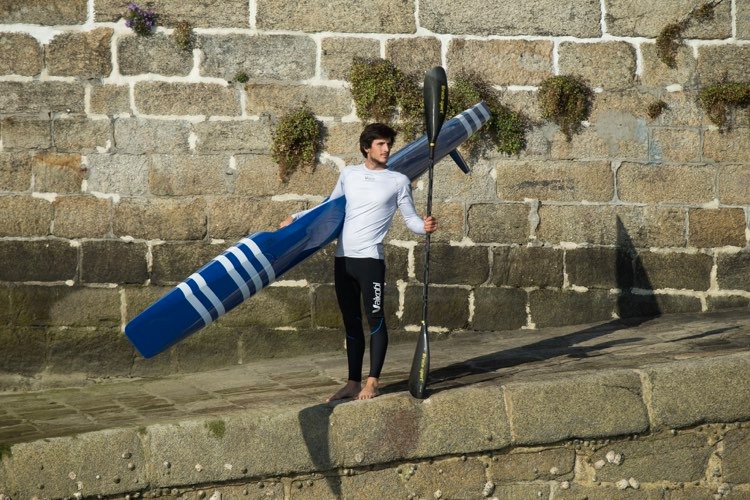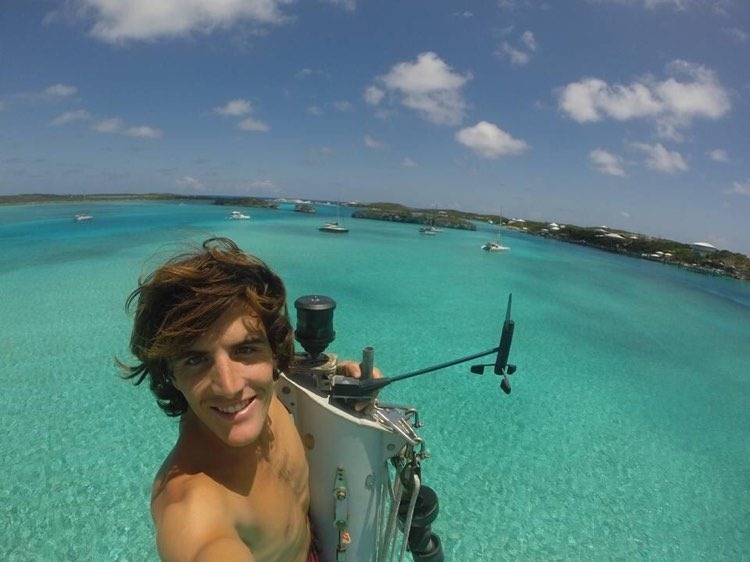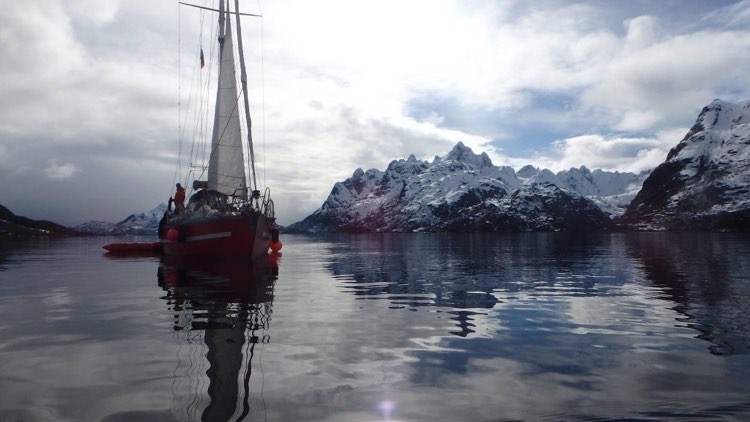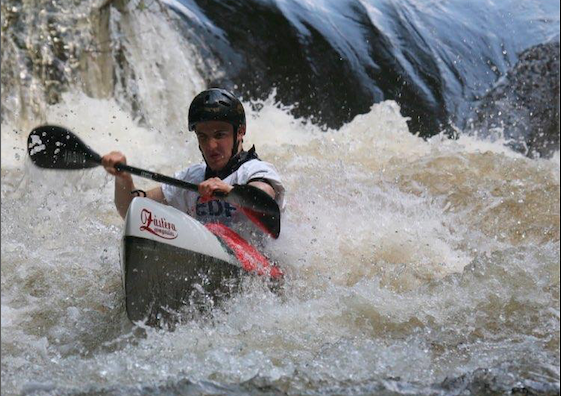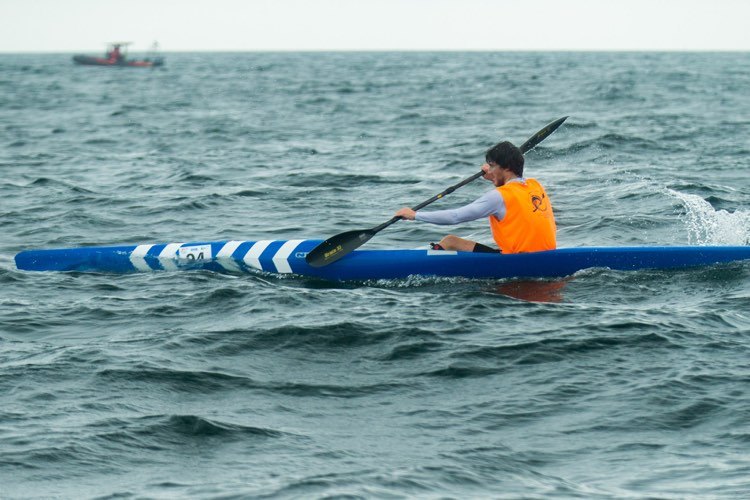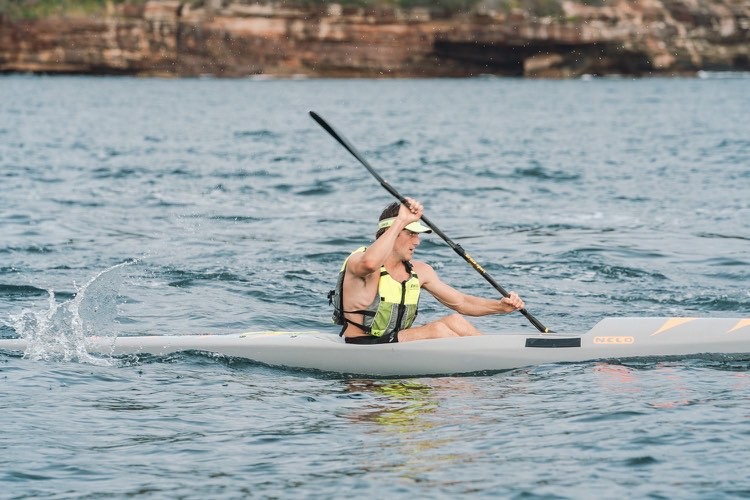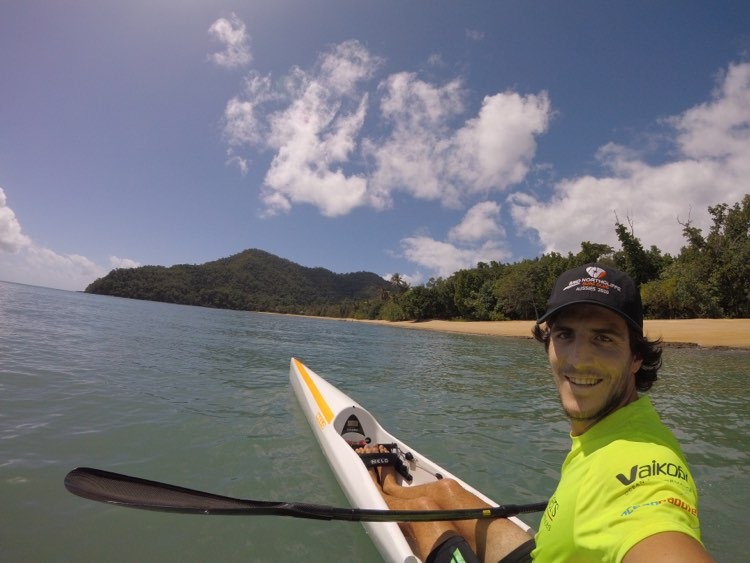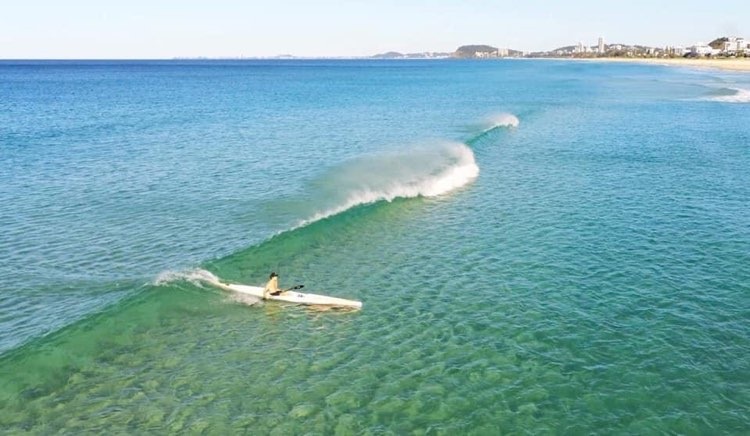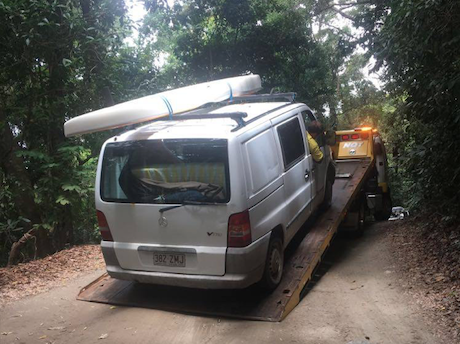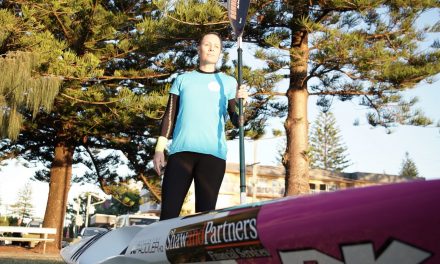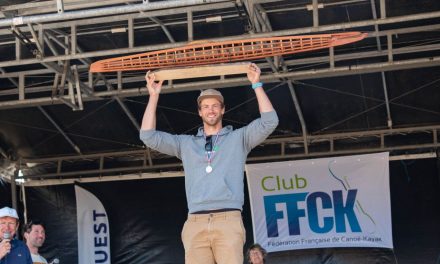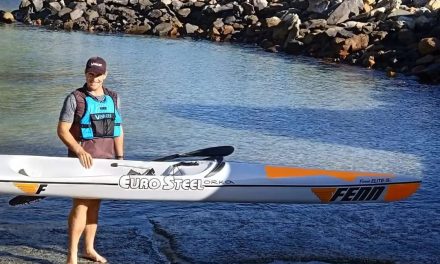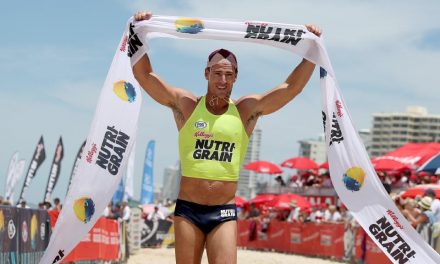IN THE BOAT with: VALENTIN HENOT
Valentin Henot is a true oceanman.
As a sailor, the Frenchman has travelled the globe, traversing seas and experiencing some of our world’s most breathtaking locations. Experience which, no doubt, has helped him to become not only one of Europe’s best paddlers, but also one of the world’s brightest emerging starts.
Although, as natural as that sounds, it hasn’t always been easy.
As he reveals in this In The Boat article, it took another trip to a far-flung land to discover why surfski is so close to his heart.
5:15AM.
It’s a Friday morning on the Gold Coast in Australia and we’re lining up for the first interval of the session.
And it’s still pitch black.
I have a look to my right – Kenny Wallace, Mackenzie Hynard and Jeremy Cotter.
Ouch, this is gonna be tough!
On my left – Tom Green, Cory Hill, Jean Van der Westhuyzen and 10 other guys that I know are not going make it any easy.
Jeremy calls it and off we go.
A couple of minutes in and I’m already gasping for air with every single muscle of my body in pain.
I can’t believe how hard this is and how quick these guys are.
But this is what I came for – paddling with the world’s best!
And getting my ass kicked too?!
Once a dream, this was now my reality… and with the rough time I was having, I knew I was in the right place!
Most people see me as a traveller, sailor, adventurer, gypsy – I quite like that one – or even as a full-time tourist.
But what I’ve always wanted to be, and the way I see myself, is as a paddler.
I was introduced to this sport by my father when I was 11 years old.
He took me out on a river where he worked as an instructor early in his life, and I loved it!
So, the following year I signed in the local kayak club, and the adventure began.
I mostly paddled slalom and wildwater until I turned 18, only occasionally jumping in a sea kayak or a surfski.
That’s despite growing up in the coastal town of Concarneau, on France’s west coast, just a couple of hundred meters from the water.
Whether it was sailing, diving, fishing, surfing or just spending days looking at the ocean – my childhood was spent in saltwater.
I was – and still am today – amazed by the power of the waves crashing onto shore during winter storms.
The smell, the noise and the rushing air brought by the sea really brings me peace.
So, when I first tried surfski, it didn’t take me long to figure out that this was what I wanted to do.
It was just so much fun – catching runs, paddling through waves and playing on the strong sea currents of north Brittany.
My love run deeps, yet for whatever reason, I’ve never been able to hold my commitment to training for more than a couple of months at a time.
In fact, the longest stretch is probably for five months leading into the 2017 ICF World Championships in Hong Kong where I finished third in the Under 23’s.
It wasn’t due to a lack of passion – life just seemed to keep sending me attractive projects or adventures – as well as injuries – that kept me away from my paddle.
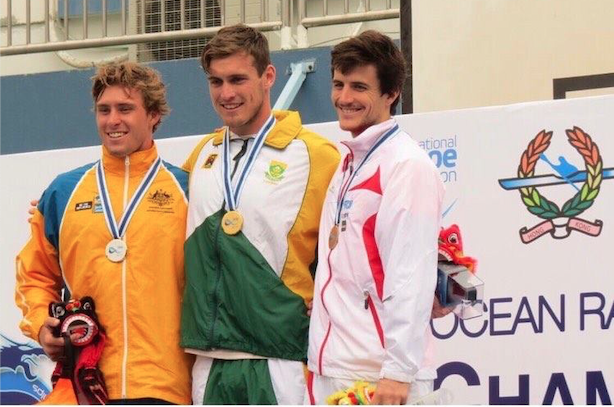
I don’t regret it. I’ve really enjoyed my lifestyle and I feel really fortunate for all the experiences it brought.
But in the back of my mind, a little voice always reminded me about surfski.
To be honest, I was often left feeling really frustrated. In a way, I felt like I was trying to escape something and protect myself in the process.
What if I put in a big training block but failed to perform? Could I deal with that?
I was really scared this might happen, and looking back, I was simply avoiding facing up to it to try preserve my ego. It was easier to deal with average racing results when I told myself that I wasn’t giving it my all.
But last year, I had enough.
I realised I have been following the same pattern for years, whether it be in sports, studies or general life choices – and it didn’t work.
I couldn’t keep doing half the job and expect the outcome to be good.
I realised I had two options:
– Quit paddling to avoid every facing up to this uncomfortable truth
– Or give paddling a proper go for at least a year and see where I could end up.
The first option held some appeal, but I knew it was one I would regret it. As said before: I consider myself a paddler – this is even how I introduce myself to people when asked what I do in life!
I knew what I had to do and began planning my paddling year.
My main focus was going to be the ICF World Championships in Portugal, but I knew I needed something else if I was going to take the next step in competition.
Australia came along as a pretty natural solution.
There are two hotspots for surfski paddling on this planet – Australia and South Africa.
I already knew SA well, having done a couple of trips there between 2013 and 2016. It is an amazing place to train and live. Warm weather, heavy winds and great, friendly training groups make it a must-go destination for all paddlers.
But this time, I wanted to experience something different.
Australia has always been on my mind, being such a famous destination for French backpackers. There are some urban legends that say you can make up to $800 a day just by picking berries or planting trees!
But I was interested in something different. Think of athletes like Cory Hill, Tom Norton, Mackenzie Hynard, Jackson Collins and Michael Booth – I could keep writing names down for a while. What’s their secret? What are they doing differently to everyone else?
Everywhere you go in the world, paddlers will tell you that two-time World Champion Cory Hill only trains 4 times a week! If it was to be true, how could he outperform such great competition, who train up to 14 times a week?! I had to find out.
So in August of 2019, I bought a plane ticket to Perth to begin my time down under with one of the most iconic event’s on the international circuit – The Doctor.
My brother Hector had been there the previous year and gave me the contacts of the local paddlers, one of them being local legend Dean Beament, who was kind enough to host me.
I had a great time racing and hanging around with mates and the sheer number of competitors shocked me! I wasn’t expecting to be so far back in the big race, but that only motivated me for 20 Beaches.
An extra month of training and acclimatising to Australia left me feeling much fitter, but on that day my main competition was the seaweed that kept getting stuck around my rudder! I finished 13th but a reminder for the next time – bring a weed deflector!
Nevertheless, I loved paddling in Sydney and staying with Noah Havard and his family. I spent the whole race looking at the beautiful scenery we were paddling past. All of the cliffs and rebounding waves reminded of my rough, stormy homeland.
But picking a place to stay and live down under wasn’t as straightforward. The country is 14 times bigger than France! There’s no way to realise just how big it is before you get there.
Luckily I knew a couple of locals helped make up my mind.
I remember a conversation with Tom Norton, where he mentioned his training squad on the Gold Coast, led by Jeremy Cotter. I got in touch with him, and he was happy to let me join them. So I headed north for warmer weather!
I got there for new year, when everyone was having a break from training, which was good because it gave me a couple of weeks to settle down, find out where I wanted to live, and do my lifesaving bronze médaillon to be able to join Northcliffe surf club.
I knew surf clubs were a big thing here, but it is beyond anything I imagined.
The buildings and facilities are huge, but I was actually surprised by how few members there are. It’s a big contrast with South Africa’s Fish Hoek Surf Club, where you see tons of nippers at training every Saturday.
I remember the first time I went down to the beach there, I asked if there was a carnival happening because there was an incredible number of people. I suppose, in Australia, other sports have taken over, leaving surf clubs far from capacity.
After a couple of weeks off my boat, Jeremy called the training season on! Now I was getting excited! I was finally about to start a full year of training and racing.
From the first session, the tone was set – every single day felt like a race.
Oh, and I forgot to mention – Aussies are early birds. We start training at 5am. Who the hell wakes up so early?! But no one seems to mind it here.
I remember riding my bike to training at 4:20am and there were already people exercising on the esplanade.
It’s a different culture, I suppose… But how good does it feel to be done with training at 7am, and have a full day ahead of you?
In those first months, I was training with Jeremy and the squad in the morning and then the surf club in the afternoon.
I could see my paddling was getting better and better and I was loving every day.
Having Jeremy as a coach and training partner has really been inspiring. He’s always providing some racing tricks, stories, motivational speeches – and above all else – building a winning mindset.
This was obvious in the few races I’ve done recently. Competition is painful and you’ve got to push your limits. But when you’re used to doing it over and over again at training, you know you can do it because you’ve been there before.
Jeremy’s squad includes names like Ken Wallace, Tom Green, Jean Van der Westhuyzen, Tom Norton, Danielle McKenzie and Ben Allen.
Forget racing – just having the opportunity to learn from this crew would be beneficial enough.
But sadly, that’s what happened.
COVID-19 struck and the world went on hold.
2020 was supposed to be my year of training and racing, and in the blink of an eye, it wasn’t happening anymore.
The whole reason for my trip disappeared… so now what?
After plenty of thinking, wondering and hoping, this is the question that was left in my mind: why do I paddle?
A few weeks of introspection lead me to a pretty depressing conclusion – I had been training and racing all these years just to satisfy my ego.
I wanted to prove to myself that I was good enough to be competitive. I was paddling to win, to be better than others.
I had it all wrong, right from the start.
Motivation fell and I lost interest.
The thought of quitting was on my mind again.
I was not going to continue paddling if it was for such a selfish reason. I didn’t want to keep feeding my ego – I knew I had to get rid of it to become a better, happier person.
Days and weeks went by, and I started to change my perception of our sport.
The winning mindset was starting to give way to a feeling of enjoyment.
I was able to have a great time on the water, content to just be out there without any need something special.
When I started kayaking at age 11, it was the most exciting moment of my week. The joy and fun I had with my friends was just amazing.
And for the first time in years, I felt like that again.
I loved every stroke of every session.
With COVID taking away the pressure of performance, I realised that I didn’t need to race to paddle. My only aim was to give my best and enjoy it – for no other reason than because I loved doing so.
This newfound perspective motivated me to become a better paddler.
I recorded 250km on the water in six days – not because I had to do it, but because I wanted to.
I was arriving early to smash some extra kilometres before everyone else. I started looking at my technique to get as much efficiency as I could from every stroke.
This is when I met Peter Dorries, who has been coaching top athletes in many different watersports, and to date, is one of Australia’s best coaches.
We shared our visions of technique and different drills, helping me to understand how to relax and use as little energy as possible while paddling.
We still have no racing, but I’ve realised that my life doesn’t rely on it.
Yes, I am looking forward to being on a start line again, but now I’ll have a big smile on my face – no matter the outcome!
I’ve learned a lot from my time in Australia and I’ve met many people who have helped me along the way.
Training methods are different everywhere in the world, but none is better than another.
I believe the secret is that if you do it with passion and you give it all you have, you’ll achieve your goal.
At the time of writing, I’m in Port Douglas, in Far North Queensland.
I left the Gold Coast a month ago, travelling the East Coast in my van with – of course – my beloved Nelo 560 strapped to the roof.
I started travelling the world seven years ago and realised pretty quickly how lucky we are to be part of the surfski community.
There’s not many places on the planet where you won’t find a fellow paddler to share a session with.
Whether it’s a lost town in a tiny archipelago north of Norway, the fjords of Iceland, the desert, Morocco, Cape Verde archipelago offshore from Senegal, the tiny islands of the Caribbeans, or even right here in the crocodile-infested waters of Port Douglas – paddlers have always been present and welcoming.
So for that, I want to say thank you.
Because that is what makes our sport so great.
And that is true reason I paddle.

